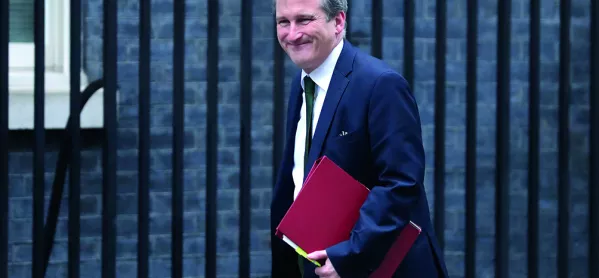The government has overstated the amount of funding it is giving to schools, according to the official statistics watchdog.
Education secretary Damian Hinds claimed in parliament that schools were set to receive a real-terms increase in school funding up to 2020.
He said, on 29 January: “We know that real-terms funding per pupil is increasing across the system - and with the national funding formula, each school will see at least a small cash increase.”
However, funding is only being frozen in real-terms, not increased.
Shadow education secretary Angela Rayner alerted Sir David Norgrove, chair of the UK Statistics Authority, to the error.
Damian Hinds correction
Sir David has now responded to Ms Rayner in writing, stating: “Officials at the Department for Education have told us that this was said in error, and the record has now been corrected.”
Mr Hinds’ corrected statement now reads: “We know that overall real-terms funding per pupil is being maintained between 2017-18 and 2019-20 - and with the national funding formula, each school will see at least a small cash increase.”
However, this is still not entirely accurate, according to Sir David, who points out that the actual amount that individual schools will receive will be determined by local authorities, rather than central government.
Therefore, he says, it is not possible to say that all schools will definitely see a small cash increase.
Funding formula
Sir David’s letter states: “Official data show that the government will increase funding for schools in cash-terms for 2018-19 and 2019-20 compared to 2017-18.
“However, as many of the department’s own communications make clear, it will be local authorities who decide how the funding is allocated - and the extent to which they apply the new funding formula.
“The Secretary of State’s suggestion that ‘each school will see at least a small cash increase’ (our emphasis) was perhaps too strong. ‘On average will’ or ‘could’ would have been more precise.”
Under the government’s original plans for the national funding formula, local authorities would have played no role in setting school budgets.
Weakened position
But bypassing local authorities in this way would require legislation - which, given the government’s weakened position after the general election, could be difficult to pass.
As a result, central government will calculate the total funding pot for each local authority, based on the national formula, but councils will decide - within certain parameters - how much each individual school should receive.
Mr Hinds was copied into the letter, which is dated 9 March.
A DfE spokesperson said: “The new national funding formula will provide a cash increase in respect of every school and every local area. Whilst we have been clear that it will be down to local authorities to decide how this is reflected in local settlements, this is to ensure stability in school funding as we introduce the national funding formula.”
“Per pupil funding is being maintained in real terms between 2017-18 and 2019-20 and we have updated the parliamentary records to reflect this.”
Want to keep up with the latest education news and opinion? Follow Tes on Twitter and like Tes on Facebook




